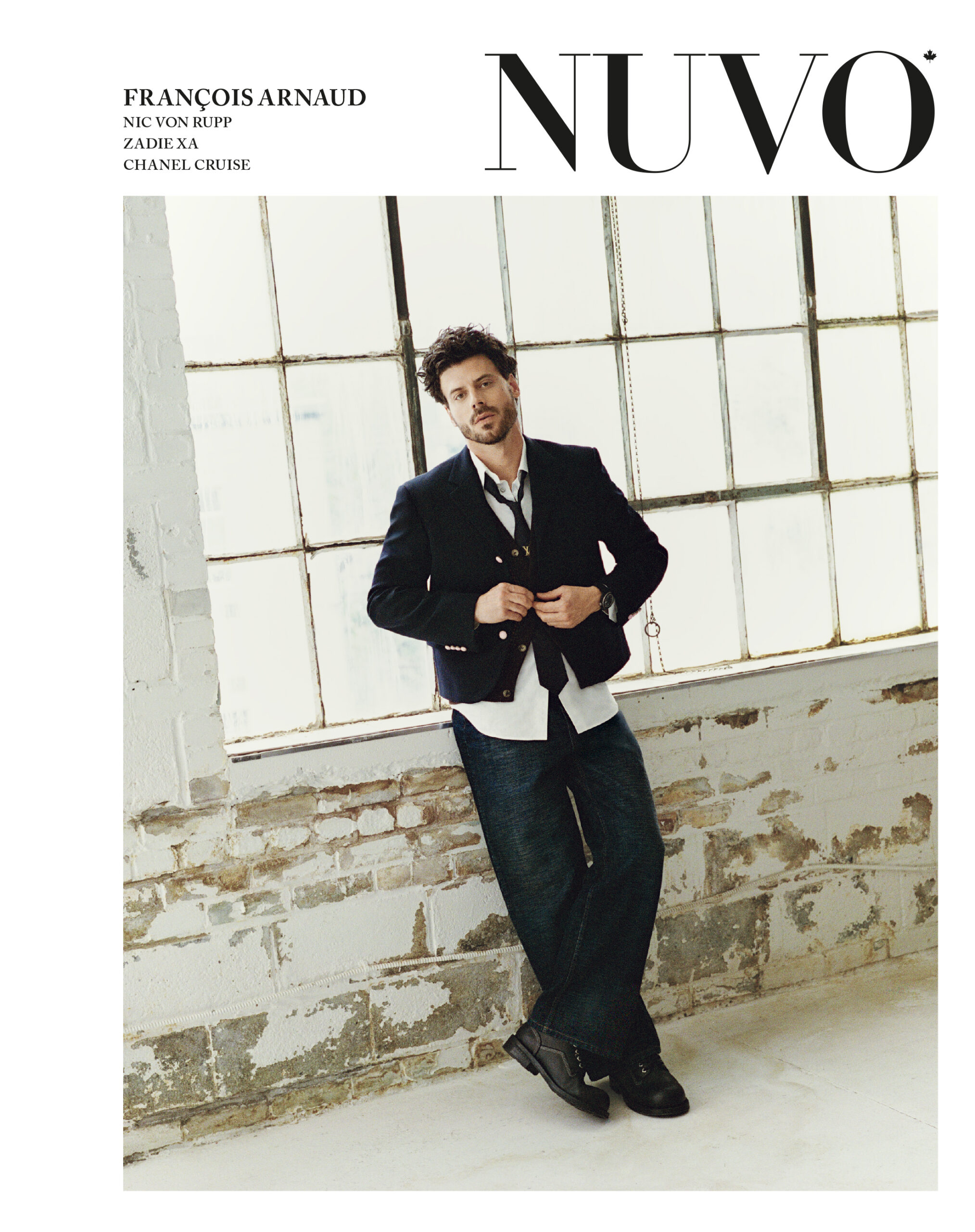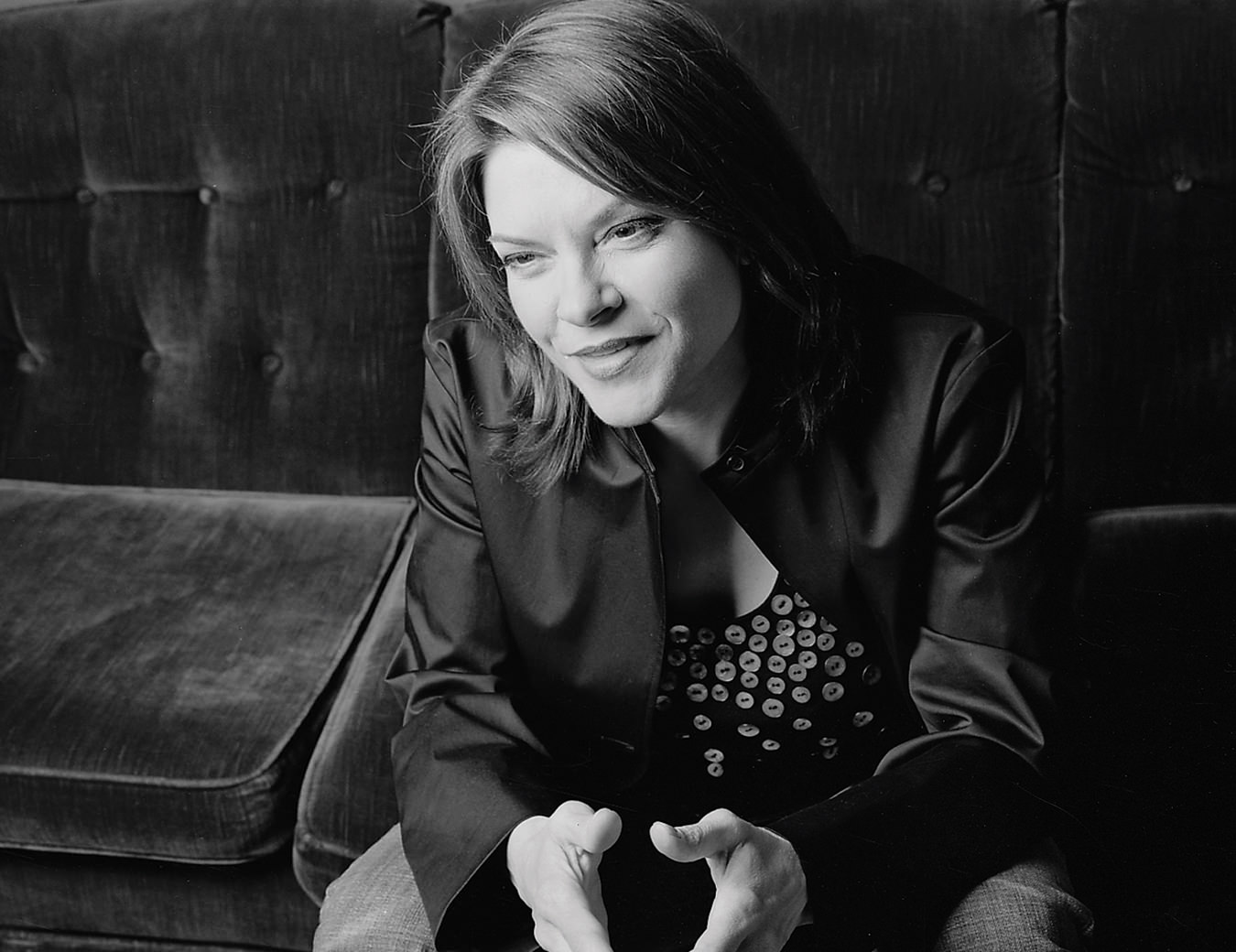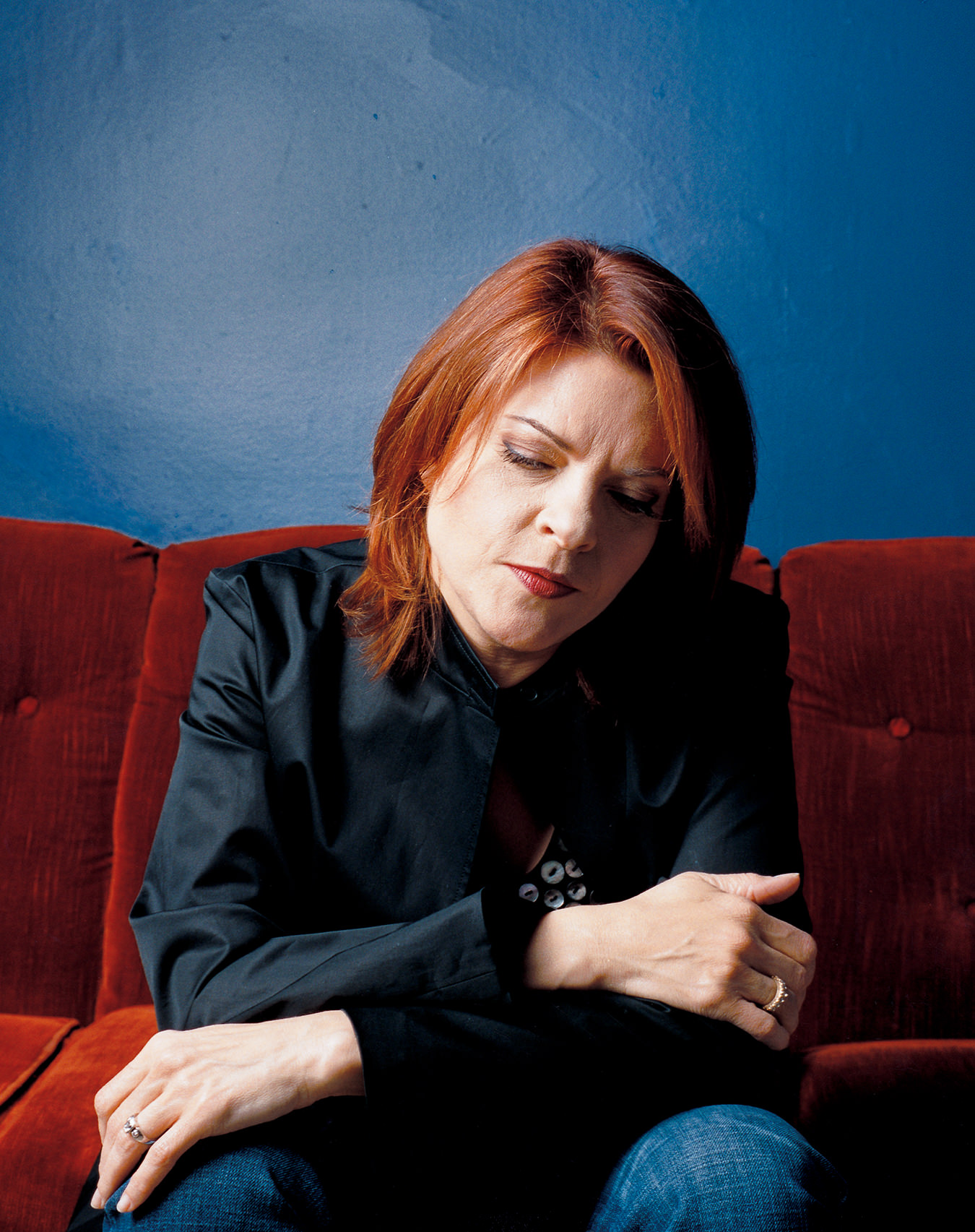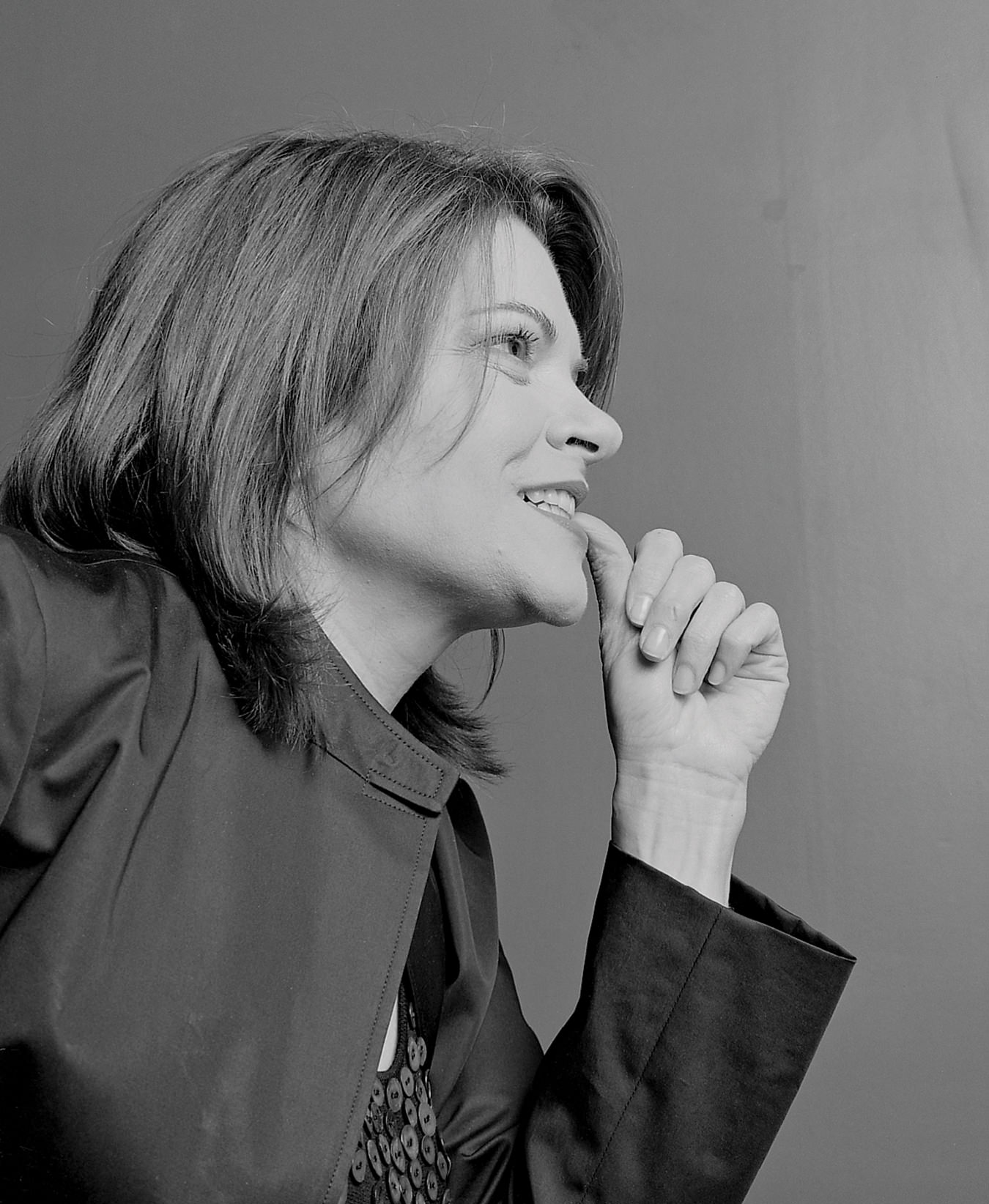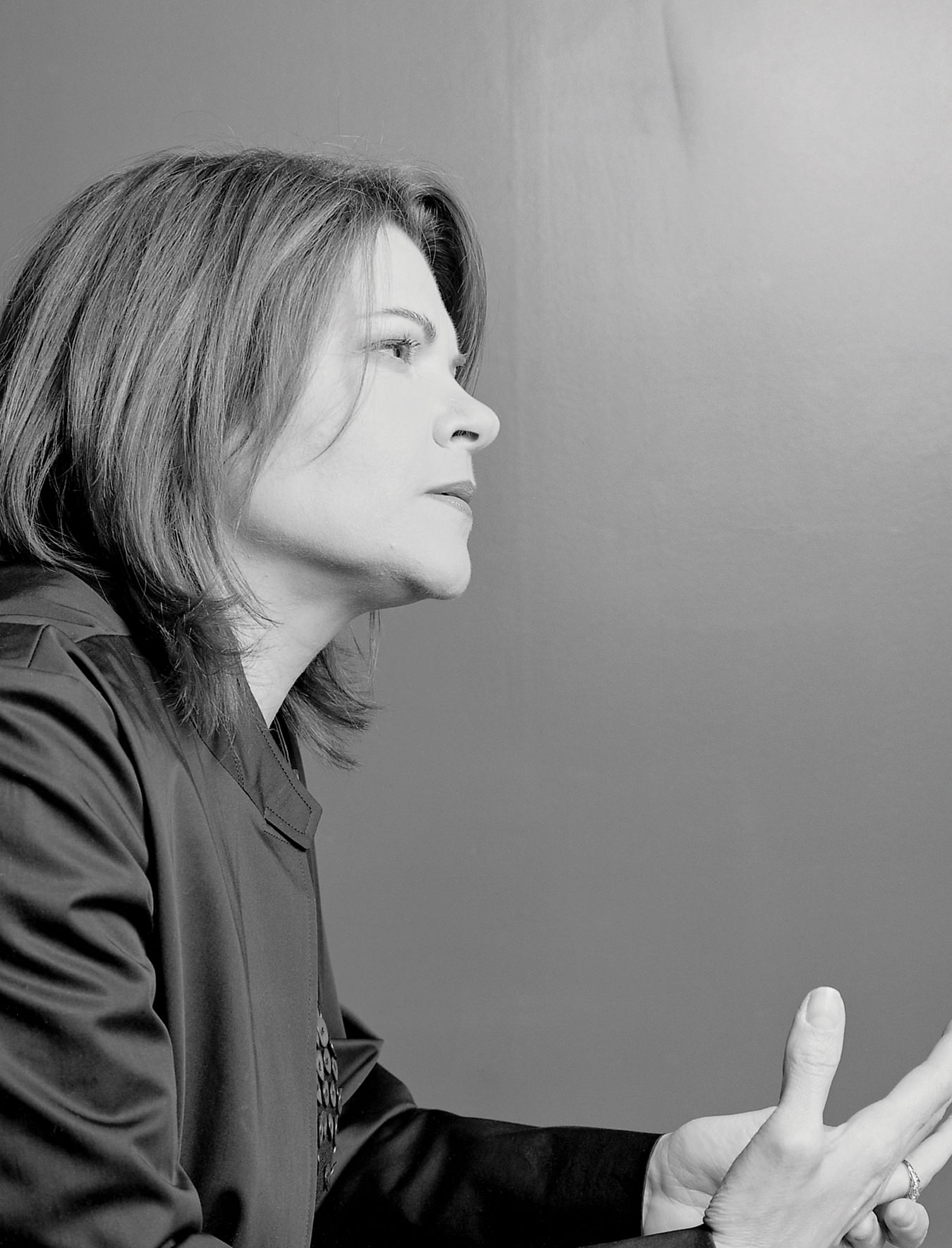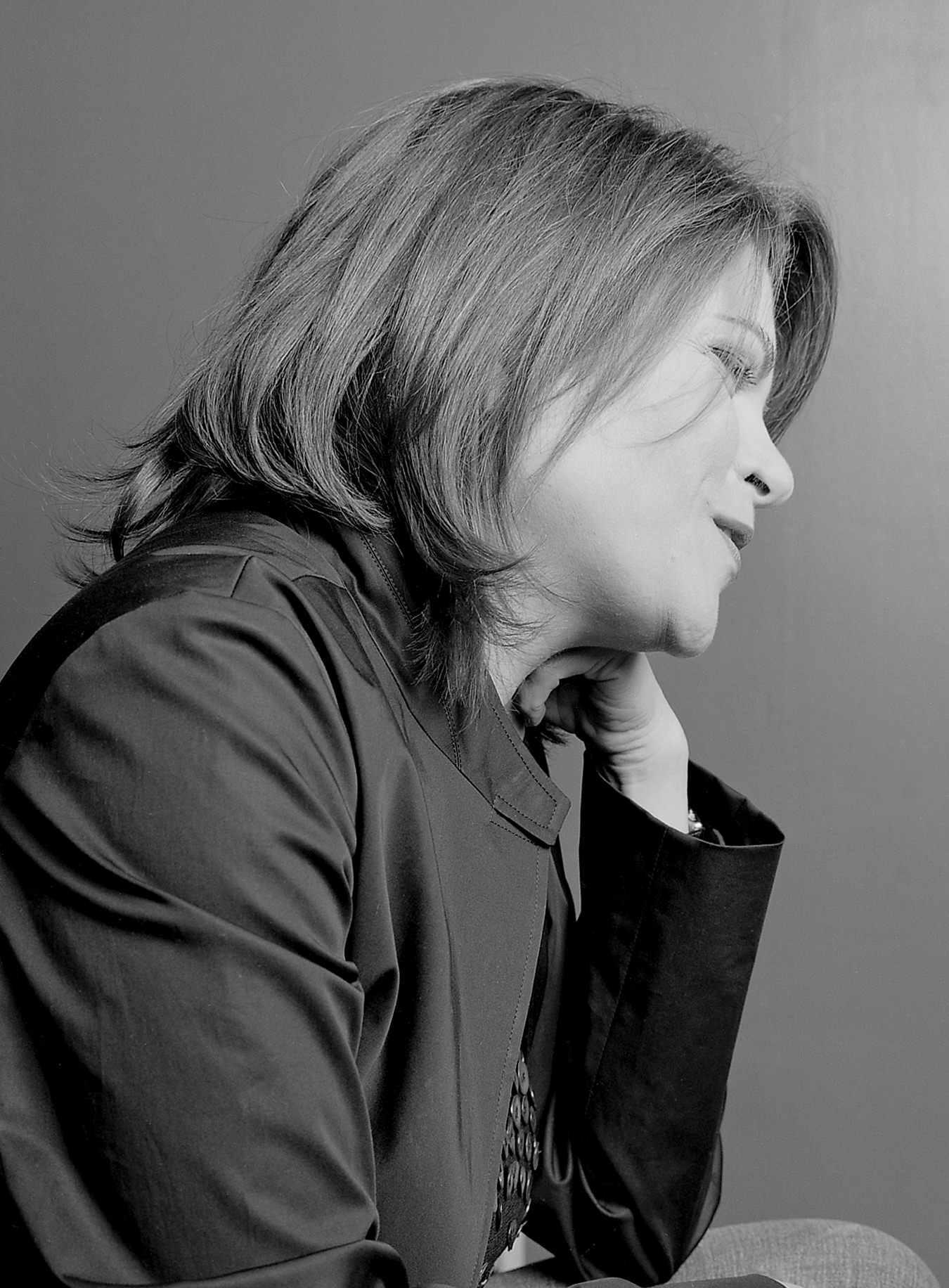The studio is hushed and lit lowly, this three o’clock in the afternoon, doing its best impersonation of the night having fallen to bring out the music and those who love it. There is, however, an anticipation, since this day the talk show is expecting an artist of repute, the real deal. And sure enough. Every time she walks into the room, there is an energy, an easy manner with all, and then, of course, the voice. During sound check for a two-song set and “couch time” on Mike Bullard’s show, Rosanne Cash takes the stage, guitars and monitors tuned and calibrated by husband and producer extraordinaire John Leventhal, who will accompany her.
The first song, title track from the new record Rules of Travel, takes on some unexpected hues when you are standing only a few feet away and that voice, deep, rich, strong, a bit bluesy and completely sans twang, rises through the air and belts back the auditorium. Then a surprise, a song from the early days, 1980, when she first hit the crossover Top Ten, with “Seven Year Ache”. In this acoustic version, there is nonetheless a clear rock and roll feel, and the song stands up amazingly well. The scant few technicians and record company folk, all of whom seem to know the song, are blown away.
And the wheel goes round and round. I will hear the song three more times throughout the afternoon and evening, and it has the same effect each time. Articulate, tough-minded, musically patient; absorbing popular music performed by an artist who has seen a thing or two in her time on the music scene. Daughter of country giant and American legend Johnny Cash, Rosanne cannot be said to have ever dwelled in his shadow. “I was raised in California. I’m really not a country girl at all” she says, and the way she and John joke about throwing their guitars away after seeing Christopher Guest’s A Mighty Wind, you believe her. “Are Ian and Sylvia still performing? Not together, I know, but are they?” Someone answers they are, in fact, and I think of a friend who covered “Someday Soon” at a Tyson tribute in Calgary not long ago.
If you want to follow a singer like this, you better hold on. Through the many records, there has been an undeniable affinity with country songs, and more than one cover of a venerable classic. But the choices of cover songs are telling: songs by Tom Petty, Elvis Costello, Karl Wallinger of World Party, The Beatles (twice, “I Don’t Want to Spoil the Party”, and, innovatively, “I’m Only Sleeping”) and on Rules of Travel a song written by Craig Northey, proud Canadian, hockey-bag toting musician formerly of the Odds (and a greatly revered party house band called Dawn Patrol). Rockers all, and Rosanne gives the songs a unique feel. “We recorded “Our Little Angel” and I was a bit surprised when Elvis called and told me ‘I didn’t think there could possibly be any tenderness in that song’.”
In her dressing room just after sound check, she relaxes, samples the fruit basket, and remembers her visits to the Commodore Ballroom in Vancouver. “A wonderful place to play. I love it there.” When reminded of an encore cover of The Supremes’ “Come See About Me”, she smiles, straightens slightly, says “I haven’t thought of that song in years.” Then easily, out of the blue, she begins to sing it, filling the space with that Motown melody but giving it a bit of the blues, and more soul than I remember from the original recording. It’s an amazing few moments. The make-up artist and the photographer pretty much freeze. The song wells up from her body, not like, say, speaking in tongues, because it has a somewhat cerebral quality, but then again not unlike it either, in the sense that it springs from a deep source. It is an ambiguity: the intuitive artist and the intellect. A kind of Yeats versus Eliot dialectic, but she wears it well. And then, the soulful rendition of the song; “I’ve been lonely/for you/I’ve been crying/those tears”. And it’s as if you were back in the Commodore, two male musicians backing her lead in a rollicking feminist reading of the song, and it all makes perfect sense.
“Even though I prefer the solitude of writing, performing is a fundamental part of who I am.”
Rosanne never wanted to be a star, or check for approval in someone else. She speaks about that voice, how, due to complications during her last pregnancy (“Everything is a complication when you’re pregnant at 44” she smiles) nodules appeared on her vocal chords. There was a period of time when it seemed she may have lost the ability to sing forever. “It was a challenge. Part of my identity as a person is my identity as a writer, but also as a singer and performer. I was having to face the possibility of losing part of that. Even though I prefer the solitude of writing, performing is a fundamental part of who I am.” But the story has a happy ending this time out. The voice finally returned.
It’s the ghost of a dream, now. On Open Mike she is funny, warm, articulate, just, in fact, like real life. Bullard had popped his head into the dressing room earlier, to offer pizza, which everyone graciously refused. Even earlier, during sound check, he had strolled onto the stage and thanked both Rosanne and John for being there. The best moment of the show in its live component came when he asked about the song on the new record, “September When it Comes”, a duet with Johnny. She had told me earlier about her father’s attitude: “Dad’s very tough, very professional. John told me ‘Rose, there’s never going to be a better time, but maybe never a better song, to do with your dad.’ So John called, and Dad asked to see the lyrics first.” On Bullard, she tells the story in a truncated version, but open Mike is just that: receptive, interested, and understanding of why Johnny wouldn’t just agree out of hand. “Of course” says Bullard, “he’s a professional. But it’s an amazing song.” And it is.
She’s got her hands, as Jerry Jeff Walker would say, on the wheel. She is a mother of five; Jake, now four, is the most recent arrival. “I think now of “Seven Year Ache” as a song my oldest daughter would have written. She’s only a year younger than the song. So it can’t possibly mean to me what it did then.” John can be heard in the nether regions of the building speaking with the baby sitter back in Manhattan; “How’s Jake? He’s eating everything?” There is a nexus between her creative self and her motherhood, her parental responsibilities. “I don’t wear two hats. It’s ‘Good Morning America’ at seven, then home to make the tuna sandwiches for the kids’ lunches. It’s all who I am. And, there are only two kids still at home now. I have the time I need.”
Those children are growing up to be “writers, actually, not musicians, though our house is full of music, always. One daughter works for a record company, too.” She rolls her eyes ever so slightly at this, and smiles a little. Writing has been another passion of hers for many years, and she is a widely published author.
Songs begin lyrics first. “I might work on something with a guitar, but almost always I have the lyrics first. The music is charted before we go into the studio, but there are a lot of changes in rehearsal. And a lot of that is John. He’s the musical visionary.” Craig Northey confirms this: “He laid down a guitar track one day, a beauty, and then he doubled it, which is nearly impossible to do uncharted and unrehearsed, but he did it. The engineer told me he does that sort of thing all the time. He’s a rare talent, and a Beatle freak, (pause and smile), but that’s okay.” Just listen to the closing notes of “Beautiful Pain”, and then check your Rubber Soul, and the very last notes of “Norwegian Wood”.
“I don’t wear two hats. It’s ‘Good Morning America’ at seven, then home to make the tuna sandwiches for the kids’ lunches.”
She feels stronger having come through the fire. “I’ve gotten a lot less narcissistic as I get older.” She leans back and loudly laughs, looks genuinely delighted as she says “Imagine. The world isn’t only about me, after all.” She laughs again at this, at the simplicity of retrospect. “I have become a better editor, the emotions are now more complex, not just a rant or a venting.” Not that her songs have ever been simply that, but the nuances of two of her favourites, “Sleeping in Paris” and “44 Stories”, show what she means. The latter song “I was able to write in the third person. I hadn’t really done that before, and I love the perspective, the slight distance that adds a complexity to it. I wouldn’t have done that ten years ago.” Does she write for an audience, have an ideal listener is mind? “I perform for audiences, but I write for the best I can be; the ideal me. That’s why I never get it quite right, though some songs are closer than others.”
There are themes, certainly, throughout the years of written and recorded songs. Clear-eyed and remarkably unsentimental while sustaining emotional resonance and nuance, always: “I always try to tell the truth. That’s why when I read the lyrics to Craig’s song, I knew I had to open the new record with it, because it begins “Do you want to be honest” (singing again). Not in a factual way, but an emotional truth. The songs are about sharing experiences.” There’s the deep chagrin of not being with the one you love, or of a relationship gone wrong, and of course unrequited love, which we have an extended discussion on. “Well, those unrequited love songs. It is, in a way, a working out of personal issues, but it’s never straight from personal experience. Even though it’s deep inside, it has to obey the demands of the form. Lines, rhymes, the three-minute format.” She thinks of examples, like “I Don’t Know Why You Don’t Want Me”: “early songs tended to be about just that one thing, about me not having something or someone I wanted. And I had experiences like that, certainly. It’s interesting, because your ego gets bruised, and you try to move on, which is not usually as easy as it should be. So writing can help that along, but the song is never finally about that specific set of circumstances. You can’t get over a lost love or a love you want but can’t have just by writing songs, anyway.” So the lyrics and music begin with an emotional note, or these days, an emotional chord, which then moves through the writing and rehearsing and recording process. “The songs require discipline, editing, and it takes a lot of work. Some come easier, some it’s like beating my head against the wall.” Each becomes something at once entirely different, but true to the origin.
The Bullard show goes flawlessly; she enjoys her time, and he is clearly thrilled she is there. Not that it puts him off his game. The banter and the joking are always there, but she comes back at him easily, and the crowd enjoys it all. The songs go the way they should, the old and the new, and her comments an hour earlier take on a different hue: “As I get older, I understand a little better how to gently close the door on certain aspects of my life. I can’t change my childhood; there are things I can’t change, so I’ve learned to accept, and move on.” As she moves on, her collaborations expand. There is the lovely accompaniment Bruce Cockburn lays on for “Rise From the Ashes” a few records ago, but on this new record there is Sheryl Crow, there is Steve Earle (“I knew it couldn’t be a pretty boy voice for that one”), and of course the man in black. Over the years the songs keep well. The musicality, the inventiveness, the strong lyrics, all in combination with that voice make her well worth the wait for a new effort.
Two hours later, there is a set at the Top ‘o the Senator, little neon sign outside establishing that there is, indeed, “Live Music” here. The club is vaguely like a Chicago blues club, Elwoodian without the grime. Here at the quiet corner of Victoria and Dundas seems an unlikely place for great live performance, but it happens all the time, a little transformation in the night. I had asked John (“New York city born and raised. One of the very few”) about some of his other projects earlier in the day, his fabulous productions of Shawn Colvin’s last two records, about the amazing guitarist Steuert Smith, with whom both he and Rosanne have worked extensively, his own house band in New York, but his mind is always moving to-wards the next performance, which in this case is about to begin. I ask how many tunes they will play. “How many would you like?” he laughs. “The whole album and a few covers would be great”, is the response. “Probably won’t get them all in, but we’ll do something a little extra.” They take the stage, the room full of invited guests, many EMI and Capitol Records people, who have shepherded the artists through a demanding day, and now everyone is relaxed, the Creemore Springs is on tap, and the show is on schedule. Several songs from Rules of Travel, including a solo version of the duet with her father, which amazingly retains all its poignancy, and the room goes very still, very quiet as she renders this particularly complex emotion into a living, breathing song for everyone. And the oldie but goodie, yet again this day, but she sings “Tell them you’re trying to cure a seven year ache/see what else your little heart can take./Boys say when is he gonna give us some room/girls say god, I hope he comes back soon.” The overwhelmingly young crowd takes it in, knows what she’s talking about.
She invites requests, hears a couple and just says “No. Not that one.” An original of Johnny’s, a hit for him in the 50s, and a cover hit for her in the late 80s, “Tennessee Flat Top Box”, is called out. “Are you up to it, John?” He feigns fatigue, and implies the song is a tough one to pick, which it certainly is. But they charge into it, and he is marvellous, and as she sings about the little boy with his guitar at the fair, the delicate interplay between all those played notes and the lyric itself is abundantly clear. It’s a great performance, and as he hits the last notes, she exclaims “Not bad for a boy who graduated from college.” Laughter, and then she adds “And who’s Jewish.” More laughter, and he responds “This song is part of my heritage. Didn’t you know that?” They have a great rapport, both on and off stage, part of what makes travelling to smaller venues to play together so natural a choice for them to make.
Rosanne sings about tough themes sometimes. About fear, and facing it, about being a woman in a man’s world, about resilience and forgiveness and that business about honesty.
The set over, about 45 minutes later, I mention to John that the songs sounded just as fresh this, the fifth time I’d heard some of them, as they did the first, several hours ago. The quintessential musician’s reply: “Thanks, man. It’s all for the show.” They shake hands with the assemblage, sign autographs, pose for a picture or two, before calling it a night.
The club empty, glasses everywhere, staff briskly picking up, spotlights long cooled and amps gone to bed, it is nonetheless easy to re-conjure the magic of the music. Rosanne sings about tough themes sometimes. From “Dance with the Tiger” on Interiors: “Don’t give me your life, I have one of my own/It was a brilliant idea inventing the home/Creatures of habit, American fools/Reaching for stars while we’re standing on stools.” About fear, and facing it, about being a woman in a man’s world, about resilience and forgiveness and that business about honesty. So, the notes still ringing in the cavernous space, it’s only natural to think about these things, to work on them a little. They are not at all unique, which is part of Rosanne Cash’s passionate point. Like she’d sung only a few minutes ago, “Wait until your memory clears/Then welcome her to roam/The desert of your misspent years/That led you to her home”. And so the cleaning, the clinking of empty glasses and the sweeping of floors continues.
Down the wide stairs and onto the street; the neon sign is still lit, and creates shadows bled red blue and white on the wet street that fortunately do not quite render the scene as James Dean on black velvet, everything calm, hushed. Still in the air tonight are the songs, the singer. Rose has 47 stories, three more than her fictional counterpart on the record. One for each year of their lives, and they both, for different reasons, want to tell them all to you.

